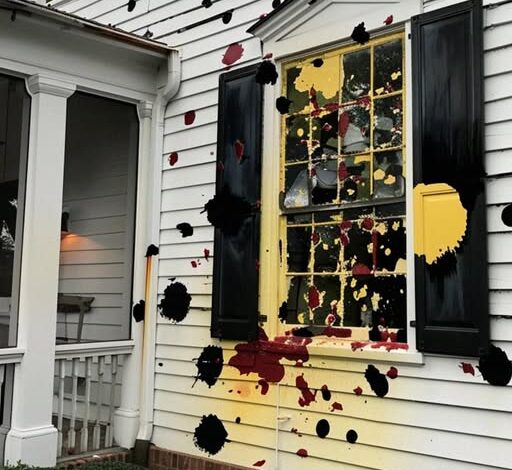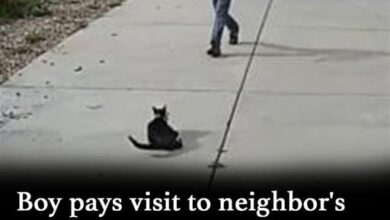
My Neighbor Totally Ruined My Windows with Paint after I Refused to Pay $2,000 for Her Dogs Treatment
When you buy into a quiet suburb, you expect trimmed lawns, polite nods, and the occasional block party. What you don’t expect is a neighbor who tries to shake you down for a $2,000 vet bill and then vandalizes your home when you refuse. I’m Julia. For more than a decade I lived in a modest, well-kept house with my husband, Roger, and our ten-year-old son, Dean. Life wasn’t perfect—Roger’s health kept us on edge—but we had a rhythm. Then Linda moved in next door with her golden retriever, Max, and the neighborhood’s calm evaporated.
At first, it was the standard friction: loud music, a dog that wandered, small boundary tests that most neighbors sort out with a quick chat. One afternoon, I was pruning roses when Max trotted over, curious and friendly. He yelped, lifting his paw; a tiny thorn was embedded in the pad. I calmed him, removed it, and walked him home, expecting a simple “thanks.” Instead, Linda met me with a glare. “Why is my dog limping? What did you do?” I explained the thorn and that he was fine. She huffed and slammed the door. I figured she’d cool off. Wrong.
The next morning, there was a note on my door: “You owe me $2,000 for Max’s treatment.” I stared at it, stunned. Two thousand dollars for a thorn? I went over, trying to keep it civil. I offered $100 as a goodwill gesture—more than fair given the non-incident. She doubled down, icily insisting on the full amount and promising I’d “regret it” if I didn’t pay. That’s when the games started.
The harassment arrived in petty, relentless waves. Garbage cans knocked over. Drive-by honking and middle fingers. Snide comments about my parenting. The nastiest stunt was when she threatened to call the police on Dean for riding a mini bike, like half the kids on the street. I was juggling his feelings and Roger’s hospital visits; I didn’t have the bandwidth for a neighborhood bully. I pulled Dean inside and told him we’d play something else. He blinked back tears and I swallowed my anger. Pick your battles, I told myself. Focus on family.
Then the call came: Roger’s condition had worsened. I dropped Dean at my mom’s, raced to the hospital, and spent two brutal days at his bedside. When I finally dragged myself home, desperate for a shower and a moment of silence, I found my house dripping in bright red and yellow paint. Every window was splattered; thick streaks bled down the glass like a bad joke. A note on the doorstep read, “Just to make your days brighter!” The rage that hit me was cold and clean. Enough.
I’m not proud of what I did next, but I’m not sorry either. I drove to the hardware store and bought Japanese beetle traps with scent lures. Back home, I chilled the lure packs so I could handle them without mess. At 3 a.m., I slipped into Linda’s yard and buried the lures deep under the mulch of her pristine flower beds. By dawn, I was back in bed, exhausted but steady. Now it was a waiting game.
The next afternoon, the beetles arrived—metallic and glinting in the sun—swarming her roses, petunias, and hydrangeas. Within days, her garden was chewed to lace. I didn’t feel triumphant. I felt… balanced. Call it suburban justice. She had vandalized my home; I’d given her a tangible consequence without breaking a window or calling the cops.
Linda’s meltdown was predictable. She stormed over, waving a shred of plastic packaging she’d dug from her mulch. “You did this!” she screamed. I kept my face neutral. Before I could respond, Dean’s sobs spilled from the hallway: “Mom, is Dad going to die?” Linda’s rage stalled. She looked past me and saw the life behind the door—an anxious kid, a sick husband, a mother stretched thin. For the first time, her bluster cracked.
“I didn’t know,” she muttered, the fight draining out of her. “I’m… sorry.” I didn’t admit anything, because I didn’t need to. I also didn’t gloat. I was done. The point had been made.
From that day, the harassment stopped. We never became friends, but the drive-by honks ended, the garbage cans stayed upright, and her threats disappeared. Her garden gradually recovered. My windows took professional cleaning and a chunk of our savings to restore, but I got my quiet back—the real win.
Here’s what I learned from the mess, and what anyone dealing with a hostile neighbor should know:
Document everything. Save notes, take photos, keep timestamps. If you need to involve authorities or your insurer, evidence speaks louder than emotion.
Don’t engage in a shouting match. Bullies thrive on a reaction. Calm, short responses or silence starve the fire.
Know your local ordinances. Noise, pet control, property damage—laws and HOA rules (if applicable) are often on your side. Use them.
Loop in your insurer and, if needed, the police. Paint all over windows isn’t a prank; it’s vandalism. File a report, even if you don’t press charges. A paper trail matters.
Protect your peace. Boundaries aren’t just fences. They’re choices about what you will and won’t allow in your life. You’re not obligated to fund a neighbor’s vet bill, especially for a minor issue you already addressed responsibly.
As for the ethical gray area: unleashing beetles isn’t a solution I’d recommend lightly. It was targeted, temporary, and—unlike paint—didn’t damage property in a way insurance calls criminal. But it was revenge, and revenge always has a cost. Mine was a few restless nights and the knowledge that I’d stepped onto the same petty battlefield I despised. Would I do it again? Faced with vandalism while my family was in crisis, I can’t pretend I’d choose differently. I wanted the harassment to stop. It did.
Years later, the neighborhood looks the same—fresh lawns, porch lights, quiet evenings—but the way I live here changed. I’m quicker to set firm boundaries and slower to justify other people’s bad behavior. I’m also faster to look beyond my own frustrations. Everyone carries something you can’t see from the sidewalk. Sometimes that “difficult neighbor” is a person drowning in their own life. Sometimes they’re just difficult. Either way, you don’t have to be their target.
If you’re stuck in a neighbor dispute, aim for resolution first: conversation, mediation, HOA channels, city code enforcement. If the line gets crossed into vandalism or threats, involve the proper authorities. Your home is your refuge. Treat it that way.
One final note for anyone convinced kindness makes you a doormat: helping someone’s dog, offering a reasonable compromise, or choosing not to escalate doesn’t make you weak. It makes you measured. Strength isn’t volume; it’s control. When Linda saw my son crying about his dad, she finally saw the full picture. We didn’t become friends, but we found a tense, durable truce. That’s often the best outcome you can get in a suburb where you still have to share a fence line.




